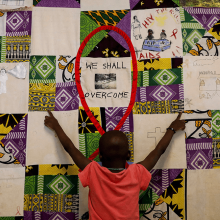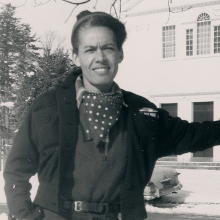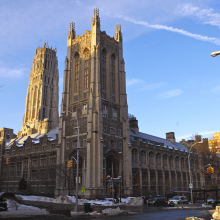News
Pope Francis, born Jorge Mario Bergoglio in Buenos Aires, Argentina, was the first in a long line of 266 popes to be from South America and the first born outside of Europe since the 8th century. The pope, also the first to be a member of the Jesuit Order, was beloved by many progressive Catholics and lauded for his priorities of uplifting marginalized communities, protecting immigrants and advocating for environmental justice. According to a 2024 Pew Research Center survey, about 75% of U.S. Catholics viewed Pope Francis favorably.
But he was also a polarizing figure. He struggled to manage the ongoing sexual abuse crisis that plagued his predecessor, Pope Benedict XVI. Pope Francis met with survivors and attempted to pass reforms within the Church, but victims continue to come forward.
In his 12 years as pontiff, Pope Francis forged a legacy of compassion, humanity, and joy. The pope’s concern for social justice was on the mind of many mourning his death. From climate change to global poverty, war and violence, LGBTQ+ people and women’s roles in the church, Francis was remembered not just for his teachings or leadership on hot-button topics, but also the Argentine’s pastoral approach to the people caught up in them.
Francis called the church hours after the war in Gaza began in October 2023, Antone said, the start of what the Vatican News Service would describe as a nightly routine throughout the war. He would make sure to speak not only to the priest but to everyone else in the room, Antone said.
An old Italian saying warns against putting faith, or money, in any presumed front-runner ahead of the conclave, the closed-door gathering of cardinals that picks the pontiff. It cautions: “He who enters a conclave as a pope, leaves it as a cardinal.”
But here are some cardinals who are being talked about as “papabili” to succeed Pope Francis, whose death at the age of 88 was announced by the Vatican on Monday.
Pope Francis, the first Latin American leader of the Roman Catholic Church, has died, the Vatican said on Monday, ending an often turbulent reign marked by division and tension as he sought to overhaul the hidebound institution.
From the first day of his administration, President Donald Trump has sought to end birthright citizenship, meaning that being born on U.S. soil would no longer be sufficient for establishing permanent legal status in the country.
So far, three different judges have blocked the executive order Trump issued on Jan. 20, which the administration has appealed to the Supreme Court. Legal scholars have pointed to over a century of jurisprudence to indicate that birthright citizenship is too well established to effectively challenge. Despite the history, the Trump administration’s attempts have ignited small-scale debates about birthright citizenship, a debate faith leaders say has too often failed to consider the ethical and moral implications of revoking it.
Sara arrived in the United States as a 7-year-old refugee when her family fled religious persecution in Bangladesh. Eleven years later, Sara now calls Montgomery County, Md., home. But if the Trump administration has its way, she would be immediately deported because of her undocumented status.
Camins Bretts, who is 61 and lives in Seattle, has crossed the Canada-United States border many times for work, family and romantic partners. But because he’s a transgender man, at least half a dozen of those trips ended in him being detained by U.S. border officials.
Meta's new "Llama 3" AI model was trained on the stolen text of poetry, sociology, fiction, theology, and more from countless writers, including a few who have written for Sojourners. Now, those writers are speaking out.

A child plays at an advocacy wall after receiving a dose of antiretroviral ARV drugs used to prevent HIV from replicating, at the Nyumbani Children’s Home, which cares for more than 100 children with HIV, whose parents died of the disease, while providing them with housing, foster care, and PEPFAR supplies of antiretroviral drugs that accelerate progress toward achieving HIV/AIDS pandemic control, in Karen district of Nairobi, Kenya Feb. 12, 2025. REUTERS/Thomas Mukoya
Steve Hoyt didn’t go to the Amecet children’s home in Soroti, Uganda, looking for a child to adopt. The missionary, engineer, and father of two went to the home for orphaned and abandoned children run by the Christian organization Youth With A Mission, to check on a child as a favor for an employee. While he was there, he noticed a baby — he guessed she was about 18 months old — languishing despite the care of the nurses.

Photograph of Pauli Murray. Murray sent this photo to Eleanor Roosevelt in December 1955. Photo by the FDR Presidential Library & Museum and used with permission.
Faith leaders, historians, and advocates are speaking out after the National Park Service removed its webpage dedicated to Rev. Pauli Murray, a pivotal figure in civil rights history who broke barriers as both a legal scholar and the first perceived Black woman ordained as an Episcopal priest.
On March 11, the Department of Homeland Security sent the Episcopal Diocese of the Rio Grande a letter insinuating illegal activities at a diocesan shelter, including human trafficking.

Union Theological Seminary on Dec. 30, 2010. Photo by David Merrett via Flickr and used with permission.
On March 8, the Trump administration escalated its attack on free speech and protests by detaining a lawful resident for his role in Columbia University’s campus protests for Palestinian rights, saying that it was the “first arrest of many to come.” Sojourners spoke to seminaries, divinity schools, and Christian colleges and universities to try and understand how schools are defending international students amid the crackdown.
As a homebirth midwife struggling with infertility, Abby Hall Luca intimately knows the gaps in fertility and maternity care. For 12 years she guided couples through the journey of growing their families while not being able to grow her own.
Before he was hospitalized for double pneumonia, Pope Francis was battling firm resistance from some of his own cardinals about how to plug a widening gap in the Vatican’s finances.
On Feb. 13, a federal judge ordered the Trump administration to unfreeze the billions of dollars in life-sustaining foreign aid suspended by executive order in January. The order, which cited “enormous harm” to global networks of relief agencies and the populations they serve, was met with relief by Christian anti-poverty and anti-hunger ministries. But even amid relief, the chaos of the last month has been relentless, say direct aid providers like World Vision and advocates like Bread for the World.
In late January, the Pew Research Center released a study of religious nationalism worldwide, including in the U.S. The results? Only 6% of Americans fit Pew’s definition of “Christian nationalist.” That's a smaller number that several previous estimates, but sociologists and researchers suggest it may just provide a shade of nuance to the way we think about religious nationalism in America.
An executive order from the White House took aim at recent policies in South Africa designed to heal old wounds left over from apartheid. Now, a group of white South African religious leaders are pushing back on President Donald Trump's claims.
Pastor Ben Squires did not have “baseless allegations of money laundering by Lutheran social service agencies” on his 2025 bingo card.
And yet, in the early hours of Sunday morning, Feb. 2, Squires found himself reading a flurry of social media posts about Mike Flynn’s unfounded accusations and billionaire Elon Musk’s promise that the Department of Government Efficiency would be “rapidly shutting down” supposedly “illegal payments” to a list of Lutheran groups including Global Refuge (formerly Lutheran Immigration and Refugee Services), Pacific Lutheran University, and Lutheran Social Services organizations in Florida, Wisconsin, and South Dakota.
Pope Francis has shown the onset of double pneumonia, further complicating treatment for the 88-year pontiff, the Vatican said on Tuesday.
















